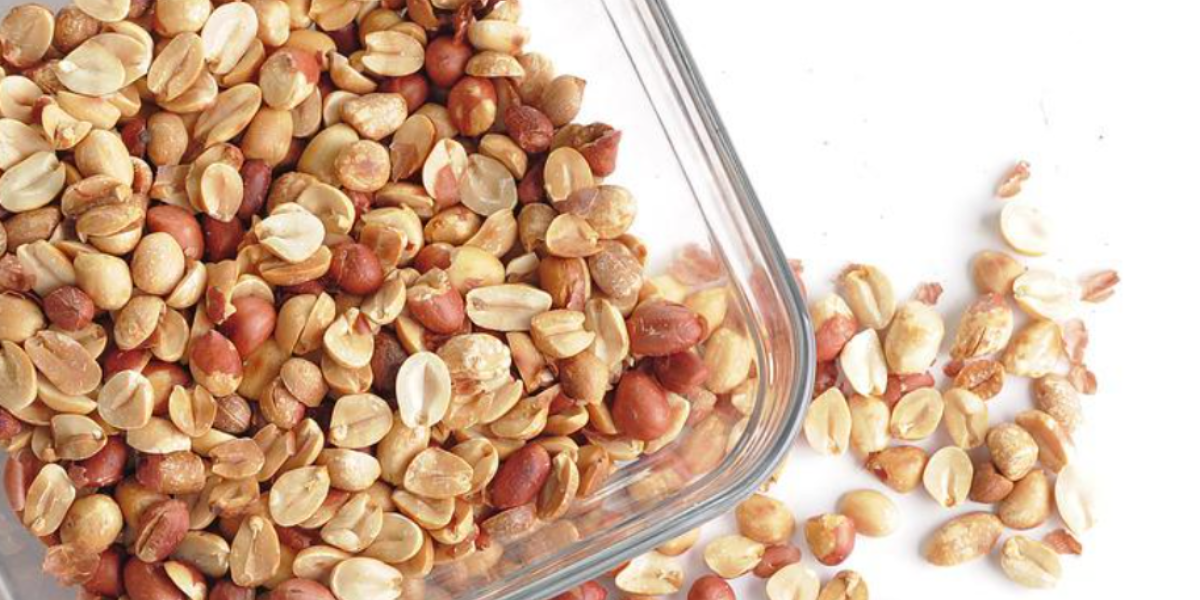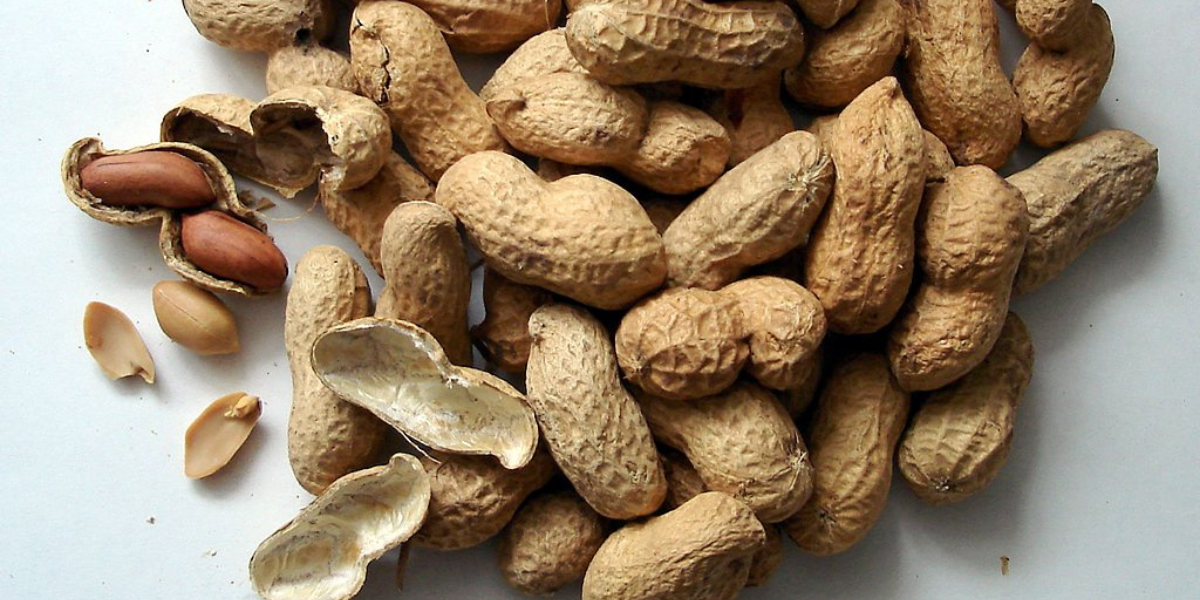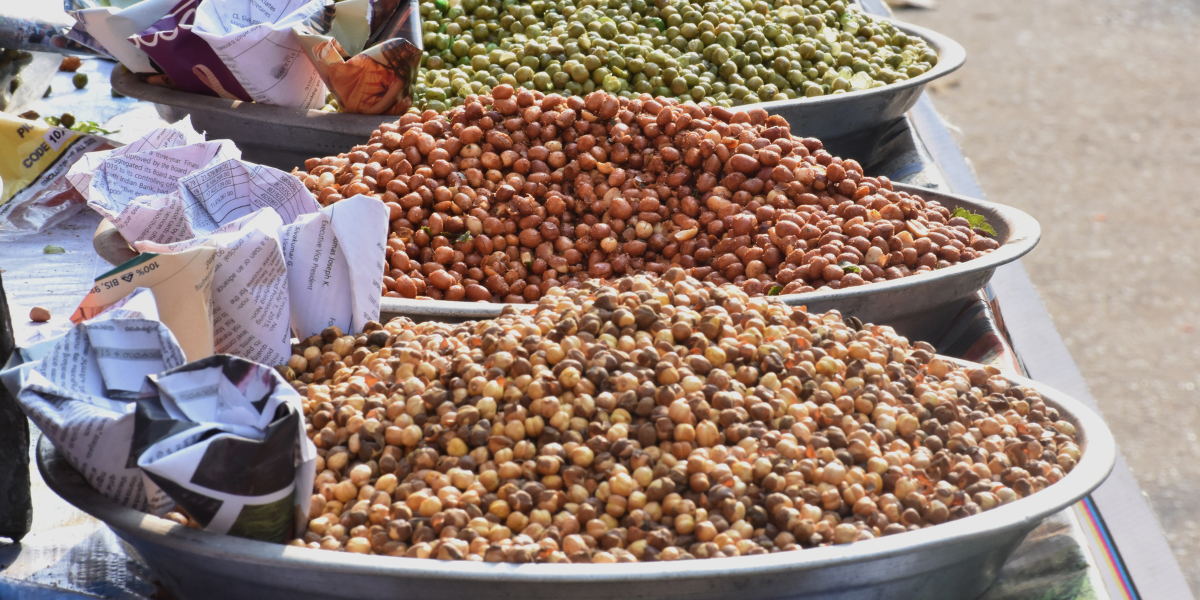Peanuts are grown in tropical and subtropical regions around the world and are commonly used in cooking and baking. They are also an important source of oil and protein for both human and animal consumption.
Peanuts are available in many forms such as roasted, salted, unsalted, and boiled, and are used in a variety of dishes. However, peanuts can sometimes cause digestive issues. Do peanuts cause gas? Time to find out!
Peanut: Background Info

Peanuts (Arachis hypogaea), also known as groundnuts, belong to the legume family and are sought after mainly for their edible seeds. Peanuts are believed to have originated in South America and were first cultivated by the indigenous people of the region for their oil, protein, and flavor as early as 1500 BC. They were also used for religious and cultural ceremonies.
The peanut plant was brought to Africa by European traders in the 17th century, where it quickly became a staple food crop. From Africa, the peanut plant was introduced to the US, where it was initially grown as a novelty crop and used mostly for livestock feed.
Peanuts began to be widely cultivated and processed as food for humans in the late 1800s. In the early 20th century, new uses for peanuts, such as peanut butter and roasted peanuts, were developed, which helped to further popularize the crop.
Peanuts can be enjoyed in many ways but it is most beneficial to eat with thin skin because the skin contains many antioxidants and phytochemicals.

Here are the nutrition facts of a 100-gram serving of peanuts with the respective percentage of daily value (DV) based on a 2000-calorie per day diet:
Calories 567
Total Fat 49.24g (63% of DV)
Saturated Fat 6.834g (34% of DV)
Cholesterol 0mg (0% of DV)
Sodium 18mg (1% of DV)
Potassium 705mg (15% of DV)
Total Carbohydrate 16.13g (6% of DV)
Dietary Fiber 8.5g (30% of DV)
Sugar 3.97g
Protein 25.8g (52% of DV)
Vitamin C 0mcg (0% of DV)
Iron 4.58mg (25% of DV)
Vitamin B6 0.35mg (15% of DV)
Magnesium 168mg (42% of DV)
Vitamin A 0mcg (0% of DV)
Calcium 92mg (7% of DV)
Vitamin D (0% of DV)
Many people believe that peanuts are not as healthy as tree nuts like almonds, walnuts, or cashews. But in fact, peanuts have many of the same health benefits as more expensive tree nuts and shouldn’t be overlooked as a nutritious food.

Here are some of the proven health benefits of peanuts:
- Helps you live longer
- Boosts energy
- Promotes heart health
- Aids weight loss
- Have antioxidative properties
- Prevents gallstones
- Lowers diabetes risk
- Supports brain health
- Relieves inflammation
- Improves hair and skin
- Helps prevent cancer
- Treats erectile dysfunction
Now, let’s keep things balanced and discuss the less desirable effects of peanut consumption.
Do Peanuts Cause Gas?
Gas in the digestive system is a part of the digestive process. Gas is produced in the large intestine when bacteria ferment the remaining undigested carbohydrates like fiber, starch, and sugar in the gastrointestinal tract. But do peanuts cause gas?
Increased gas production or gas pain can also result from eating foods that cause more gas. Unfortunately, one of the foods most likely to cause gas is peanuts. So why do peanuts cause gas? This is due to several reasons.
-
Peanuts are hard to digest.

The high fat and fiber content in peanuts means that it may take some time for them to be properly digested. Peanuts require 2.5 to 3 hours to digest and since they take longer to pass through your digestive system, the risk of gas is significantly increased.
Gas pain can occur when gas enters but does not move sufficiently through the digestive tract. When you are suffering from excessive gas, you will be experiencing the following symptoms:
- Burping
- Passing gas
- Bloating
- Abdominal cramps
- Abdominal distention
-
Peanuts contain phytate.
Contrary to popular opinion, peanuts are not nuts but legumes. Therefore, just like other legumes, peanuts are high in phytate or phytic acid.
Phytates can cause gas in some people because they are also not easily digested by the human body. Phytates are found in high amounts in certain plant-based foods, such as beans, seeds, nuts, and whole grains, and can bind to certain minerals such as iron, zinc, calcium, and magnesium, reducing their absorption.
When phytates reach the large intestines, they go through digestion and produce gas as a byproduct. The resulting gas can contribute to bloating, discomfort, and flatulence.
However, not everyone undergoes these digestive issues when consuming phytates, and some people can tolerate them without any problem.
-
You have peanut intolerance.

Peanut intolerance is a digestive problem in which the body reacts to certain proteins in peanuts which can cause discomfort without the need for immediate medical intervention.
Peanut intolerance can cause excessive gas production in the gastrointestinal tract. This happens when the small intestines have difficulty digesting proteins which leads to stomach irritation and swelling.
Gas or flatulence is a common symptom of peanut intolerance, along with other uncomfortable symptoms including:
- Heartburn
- Abdominal pain
- Reflux
- Nausea
- Vomiting
- Diarrhea
- Headaches
- Irritability
- Fatigue
Some gastrointestinal illnesses, such as irritable bowel syndrome or celiac disease, can also cause gas in addition to other signs and symptoms.

Of course, it is obvious that peanut butter and peanut oil both contain peanuts. But if you have a peanut intolerance, you must also avoid foods that may have peanuts among their ingredients such as:
- Baked goods
- Cereals
- Trail mix
- Candy
- Soups
- International cuisines
If you experience excessive gas and bloating after eating peanuts, it may help if you try eliminating them from your diet and see if your symptoms improve. You can also try eating smaller portions of peanuts to reduce consumption of the compounds that are causing this discomfort.
It is important to consult with your doctor if you feel any adverse symptoms every time you eat peanuts. However, it is necessary to emphasize that a peanut intolerance is different from a more serious peanut allergy.
What To Watch Out For

Peanuts are a healthy food, but not everyone can enjoy them. Peanuts contain the proteins arachin and conarachin which may cause severe allergic reactions in some people. Peanut allergy is one of the most common food allergies in the United States, causing the majority of all food allergy deaths.
A mild peanut allergy may appear with symptoms such as itching, nausea, or facial swelling. However, a severe peanut allergy can lead to a life-threatening condition called anaphylaxis.
Symptoms of anaphylaxis include breathing difficulties, lack of alertness, extreme drowsiness, nausea, vomiting, seizures chest pain, and swelling of the tongue, face, or lips. You may also feel very weak, dizzy, and confused.
A peanut allergy will require immediate medical attention. So how can you tell if what you have is a peanut intolerance or a peanut allergy? A peanut intolerance involves the digestive system while a peanut allergy involves the immune system.
The Takeaways

Peanuts are one of the most popular snacks known to mankind. They are crispy, tasty, and delicious. The kernels are rich in many essential nutrients that are beneficial to overall health and well-being. Incorporating peanuts into your diet can yield great results whether your goal is to lose weight or improve your health.
However, as in everything good for you, eating peanuts can also have disadvantages. In fact, there is a considerable number of them. Do peanuts cause gas? Yes, they do, but the numerous health benefits they provide make consuming them worthwhile as long as you are not allergic to peanuts.

